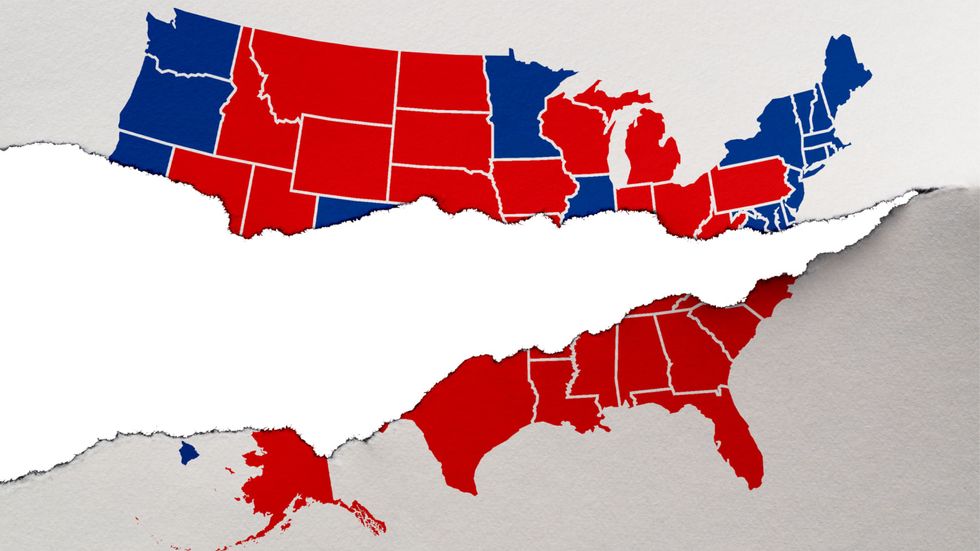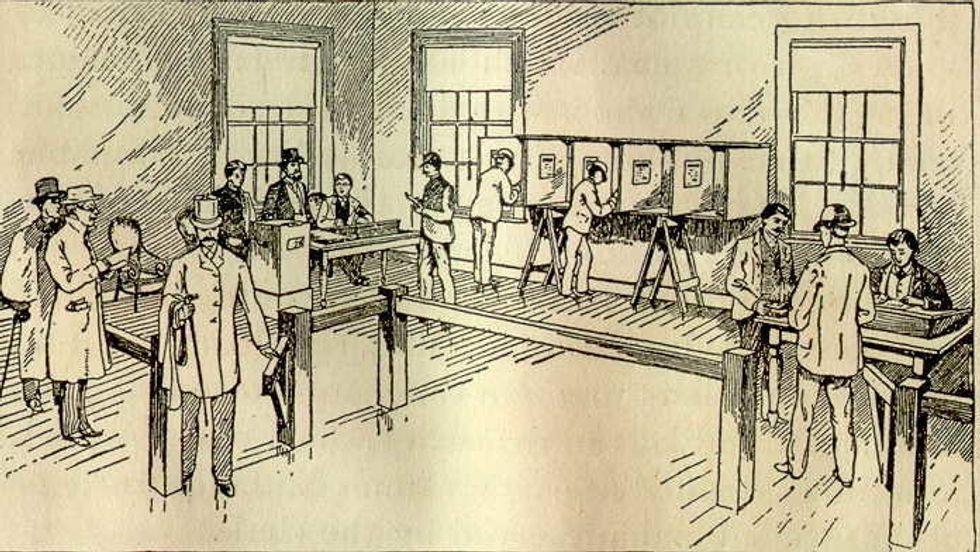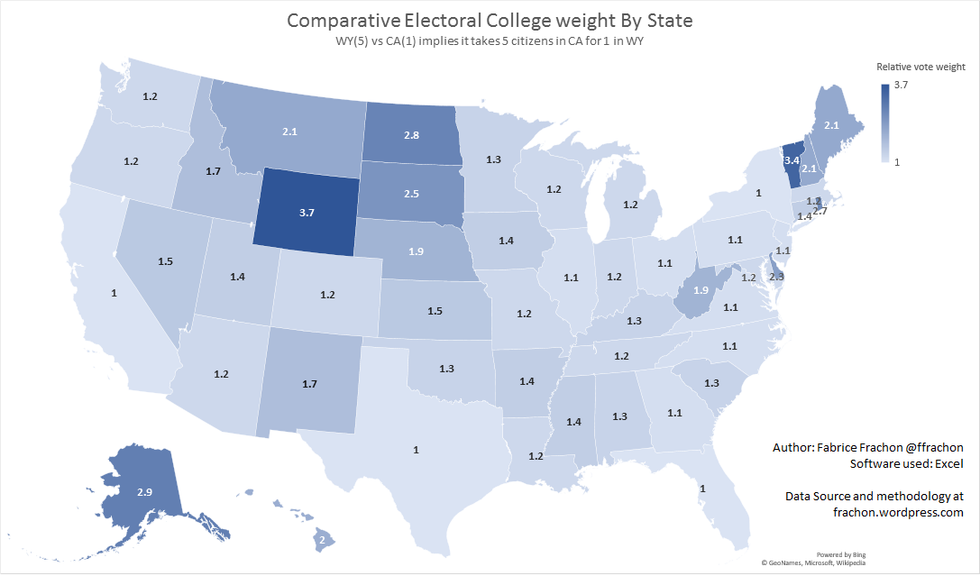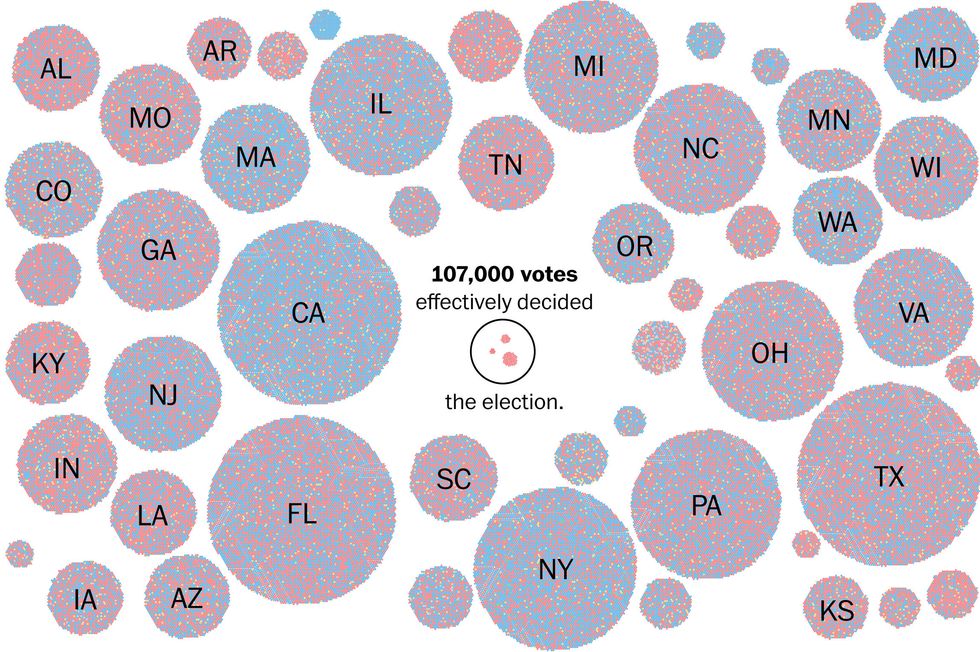The 2020 election is less than a year away, with the Iowa caucuses in just a couple of months, and it is still unclear who will be going up against Donald Trump in November. The Democratic party is fractioned into those concerned about electability and those championing a progressive agenda, and the Republican party is fighting with all the strength they can muster to hold onto control. The campaigns are in full swing, with Democrats attacking Trump from every angle they can think of and Trump bargaining with the American people to give him a second term. Impeachment is dominating the news cycle, leaving many in the middle saying, "Why impeach when we can just vote him out in 2020?"
Here's the secret they don't want you to know.
The 2020 election is already rigged in favor of Trump.
Not because he asked Ukraine for investigations, or because of voter suppression measures in place and being passed across the country, or because of the "silent majority."
The scam is our electoral system itself.
The electoral college is as old as our country itself, scripted in the Constitution in 1787. But a lot has changed in nearly two and a half centuries, including the very principles on which the electoral college was created. In 1787, slaves counted as three-fifths of a person; women, minorities, and non-land-owning men could not vote; and the general public was blissfully unaware of politics, including presidential elections. The electoral college worked in 18th-century, newly-founded America. But how does it work in the 21st century?
The electoral college was a compromise. One group of the founding fathers did not want Congress to elect the president because they were worried about corruption, so they argued for a popular vote. The other group was concerned about letting the general population elect a president, as they were mostly uninformed about politics. After days of arguing, the founding fathers compromised on neither. Each state would have a certain number of electors who would then in turn elect the president. These electors were trusted by the people to make an informed decision. But over time, media evolved and the general public became more and more informed. The electoral college shifted closer to a popular vote, where the population cast their votes for the president and vice president, rather than just for an elector. But then in the 19th century, most states moved to the winner-takes-all system now associated with the electoral college. And that is where it all went wrong.
When the electoral college was created, there were no political parties, and certainly none of the founding fathers envisioned a future where America was ruled by a two-party system. As parties began to develop and increase in power, electors lost their independence and became bound to their political party. At this point, electors were mostly chosen by each state's legislature. Seeing an opportunity in this, many state legislatures shifted their system so all their electoral votes went to the candidate with the plurality, rather than splitting the votes proportionally, ensuring the candidate of the party in power would receive the entirety of that state's votes. That is how the winner-takes-all system in place today came to be – a product of a partisan scheme to stay in power.
Not only is the system itself rigged, but it is now incapable of fixing itself. The winner-takes-all system would have much less of an impact if electoral votes were appropriated proportionally. However, many smaller states have a lower population-to-elector ratio, meaning each person's vote has more value. In the states that have the most electoral votes, like California, Texas, New York and Florida, there is a disproportionately high population-to-elector ratio – there is only one elector for every 650,000 people. Meanwhile, states like Wyoming, Vermont and North Dakota may only have three or four electoral votes, but they have one elector for about every 200,000 people – so if you live in Wyoming, your vote counts nearly four times as much as someone living in California. It may seem like a relatively easy fix to just have an equal population-to-elector ratio in each state, but the number of electoral votes is determined by a state's number of House representatives, and a constitutional amendment in 1929 capped the total number of representatives at 435. Without a state's number of representatives being able to increase with the growing population, their electoral votes also will not increase proportionally. The allocation of electoral votes is updated every ten years with the census, but the total number of electoral votes does not change; votes are shifted from states with the least population growth or net loss to states with the most growth. However, this reallocation does not completely account for all population growth. As long as the number of House representatives is capped at 435, electoral votes will never be equally weighted among states.
Aside from the unequal weighting of electoral votes, the electoral college does not take into account the margin by which a candidate wins. For example, both Florida and New York have 29 electoral votes. In 2016, Democratic candidate Hillary Clinton won New York by over 20 points, while Republican candidate Donald Trump won Florida by just 1 point, yet they both received the same number of electoral votes. Historically, the Democratic-leaning states with the most electoral votes vote Democrat by a much larger margin than the Republican-leaning states with the most electoral votes. The Democratic Party has three major electoral strongholds in California, New York and Illinois at 55, 29 and 20 electoral votes, respectively. Each state has voted for the Democratic candidate by a margin of more than 15% in every election in recent history. In contrast, the only major electoral stronghold the Republican Party has is Texas at 36 electoral votes; however, Texas voted for Republican Donald Trump by only a 9% margin in 2016. Every other Republican-dominant state has only 11 electoral votes or fewer. The electoral college does not take margins of victory into account, deepening the divide between an electoral victory and popular victory.
The impact of the electoral college means each presidential election comes down to just a few key swing states. A popular argument in favor of the electoral college is it gives more of a voice to rural America, and that the big cities should not get to choose a president for the entirety of the nation, since what rural areas need is very different from what urban areas need. This is true; without the electoral college, candidates would have no reason to campaign in rural areas or give any thought to them in making policy proposals. But the reverse is also true. With the electoral college, rural America, specifically a handful of swing states, chooses the president. Why should people in those few states get to decide who runs the entire country? The most reasonable thing to do is to amend the electoral college. Instead of basing the number of electoral votes on the House of Representatives, have an equal population-to-elector ratio in each state. Modify the winner-takes-all system to model the system in Maine and Nebraska, where a certain portion of their electoral votes are given to the candidate who wins the statewide popular vote and the remainder of the votes are given proportionally. This way, rural Republican areas in traditionally Democratic states, such as northern California, or urban Democratic areas in traditionally Republican states, such as big cities in Texas, will all have their voices heard, without alienating any sector of the country, and the majority of the nation will pick the president.
Wanting fair and balanced elections should not be a partisan effort. Republicans should want to change the system, even though it traditionally benefits them, and Democrats should not want to abolish the system just because it puts them at a disadvantage. Both parties need to come together and recognize the electoral college as it stands does not accurately represent the country and come up with a system that does.
On the web:
https://www.thegreenpapers.com/Census10/FedRep.pht...
http://www.slate.com/articles/news_and_politics/ma...
https://www.fairvote.org/how-the-electoral-college...
https://www.politico.com/2016-election/results/map...
https://www.270towin.com/historical-presidential-elections/timeline/margin-of-victory/
- A Case Against the Electoral College ›
- Abolish The Electoral College! (Part 1) ›
- 4 Reasons Why The Electoral College Is Unfair ›
- How to Fix The Electoral College - Citizens Take Action ›
- You can help fix the Electoral College | National Popular Vote ›
- How to fix the Electoral College with a federal law - Vox ›
- A bipartisan solution to fix the electoral college | TheHill ›
- The Electoral College: A Surprisingly Easy Fix - DAVID BRIN ›
- How to Reform the Electoral College So the People's Choice Prevails ›
- How to Fix the Electoral College System ›
- An Idea for Electoral College Reform That Both Parties Might ... ›
- How states can fix the Electoral College and prevent future Trumps ›
- Opinion | Fix the Electoral College — Or Scrap It - The New York Times ›
- Why Democrats Want to Abolish Electoral College and Republicans ... ›
- The Electoral College has to go — here's how we do it | TheHill ›
- Democrats Need to Make Getting Rid of the Electoral College a Top ... ›
- Get Rid of the Electoral College | Elizabeth Warren ›
- Abolishing The Electoral College Would Be More Complicated Than ... ›
- How the US could actually get rid of the Electoral College ›
- What getting rid of the Electoral College would actually do ... ›
- Opinion | Getting Rid of the Electoral College Isn't Just About Trump ... ›























